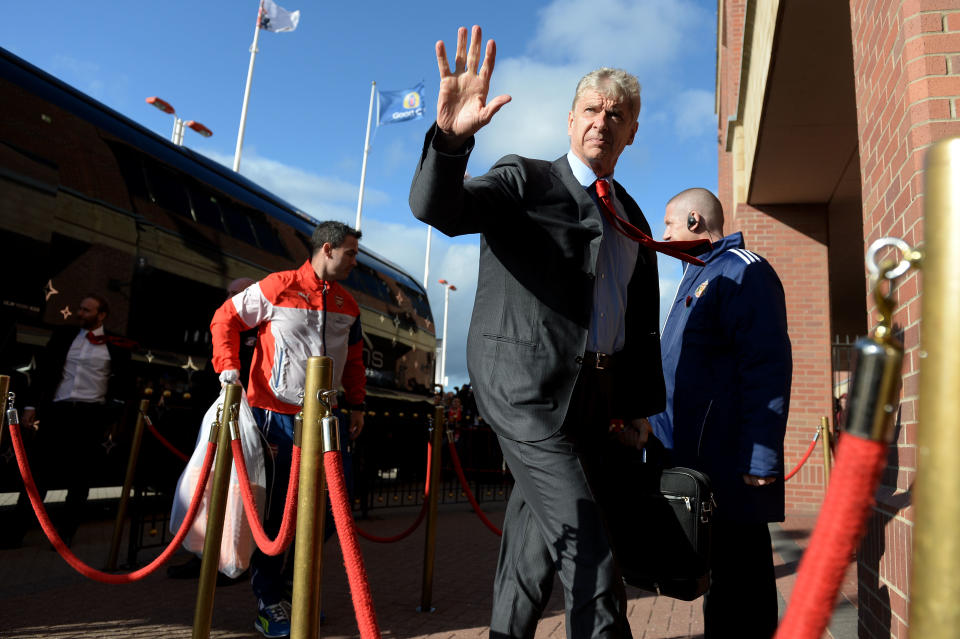It's complicated: The maddening genius of Arsene Wenger
And just like that, he was gone.
Well, not quite just like that. There’s still the matter of a Premier League season to conclude and a Europa League trophy to contest. But there is the unmistakable sense of an era ending today, as the soccer world reacts to the news that, after 22 years in charge, Arsene Wenger will be stepping down as Arsenal manager at season’s end.
It’s the day that, even while increasingly clamoring for it, a great number of Arsenal fans perhaps never truly believed would arrive.
For many Arsenal supporters of a certain age, Wenger is the only manager we’ve ever known at the club. He seemed eternal, unrestricted by the realities of the modern game. The idea of him not being there is difficult to wrap your head around. Like hearing that the Rolling Stones will be breaking up at the conclusion of their next tour.
Suddenly, all those listicles about “Top 10 Candidates to Replace Arsene Wenger” are at least semi-tangible news stories, rather than merely some soccer journo playing fantasy football with words. When the 2018-19 season kicks off in August, there really will be a manager who is not Arsene Wenger on the Emirates touchline.
The most obvious modern parallel is Sir Alex Ferguson’s 2013 retirement at Manchester United, although Ferguson went out on top, a title-winner.

Wenger, the once-feted visionary who transformed the North London outfit from “boring old Arsenal” into the blueprint for what a modern, successful Premier League side should look like, has in recent times been increasingly perceived as a stubborn old goat who puts his own ego above the club. An albatross over the heads of a team and fan base desperate to keep pace with the modern realities of the game, but saddled with a manager who seemed strangely unwilling to accept them.
Currently sitting in sixth, 33 points behind impending champions Manchester City and 14 points off Wenger’s hallowed “fourth-place trophy”, it’s been a long, protracted fall for Arsenal from the lofty heights of three league titles, the Invincibles season and a Champion League final.
Over the past dozen years, Wenger and Arsenal have clung to one another like an aging couple that no longer gets along, but refuses to accept that the spark of their early, idyllic romance has gone.
The mediocrity some Arsenal fans feared in the wake of a Wenger departure has already set it. The Gunners aren’t in the Champions League this season and won’t be in it next season, unless Wenger can mastermind a course to a Europa League triumph. But that will first demand he outmaneuver a formidable Atletico Madrid side managed by one of the supposed candidates to replace him in Diego Simeone.
But Arsenal has in fact already been in a kind of post-Wenger mode for a season or more. Not just in terms of the club’s diminished standings, but also in regards to its dealings, both on and off the pitch. Splashing the cash on flashy January window signings like Pierre-Emerick Aubameyang and Henrikh Mkhitaryan may have thrilled the fans, but it’s practically the antithesis of the Wenger way.
Gonzalo Higuain, Luis Suarez, Radamel Falcao and Thomas Lemar are just a few of the players Arsenal could have signed but failed to in the past five years. Had the club (some blame Wenger, others the board) been willing to pay market value, any one of these world-beaters could well have wound up decked out in the North London outfit’s iconic red and white strip.

The Frenchman made his name by uncovering diamonds in the rough, in semi-obscure places, an underutilized Juventus winger named Thierry Henry for example, and transforming them into Premier League stars. Dropping lorry loads of cash for established, proven players is just not what Arsene does.
It’s Wenger’s steadfast, and often stubborn, commitment to his ideals on the game that first enraptured and later infuriated Arsenal fans. And yet, no matter how frustrating the late Wenger period has been at times, no matter how out of touch the manager seemed with the ways of the modern game, there remains something deep in the hearts of a great many Arsenal fans that wants to see the club not just win, but to win the Wenger way.
While in the early years of the manager’s time in England, we grew accustomed to seeing this happen regularly, in recent years we’ve had just fleeting glimpses of it. Three FA Cups in a span of four seasons is nothing to sneeze at, especially last May’s swashbuckling victory over then newly crowned champions, Chelsea.
Even if winning that grand old trophy today falls some considerable measure below the prestige of the Premier League or Champions League, it’s a trophy nonetheless. Trophies that were won by teams playing (mostly) the Arsenal way, as we have come to know it. And the reason we’ve come to know it as that is absolutely down to the stubborn, brilliant, maddening, inspiring, frustrating and ultimately illuminative genius of the man who changed not just Arsenal Football Club, but English soccer as a whole.
With the Europa League semifinal clash with Atleti looming on the horizon, Arsene Wenger may yet have one final encore before the curtain comes down on his Arsenal career.
More soccer from Yahoo Sports:
• Arsene Wenger will step down after 22 seasons as Arsenal manager
• Gulino: Wenger’s legacy is now up to us to figure out
• Arsenal players, legends, executives react to Wenger’s announcement
• Who will succeed Wenger at Arsenal? Here are the top candidates



